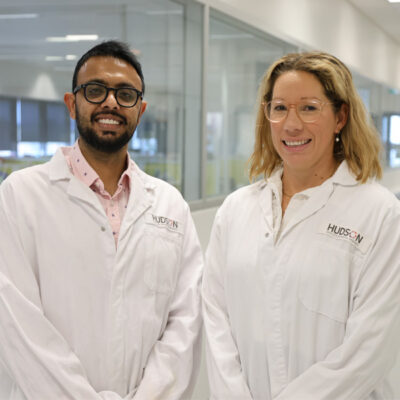Closing the gap in our tiniest patients
By Hudson Institute communications

Could a common nutritional supplement, creatine, greatly reduce risks of brain injury in our tiniest patients, saving them from severe lifelong complications?
While more preterm babies are surviving at earlier ages, many have long-term challenges as a result of impaired brain development or brain injury around the time of birth. Sadly, these conditions require lifelong medical care.
Creatine is essential for healthy brain development in humans. During pregnancy, creatine is transferred from mother to developing baby through the placenta and, when a full-term baby is born, he or she must obtain enough creatine through their diet, or generate their own creatine through their kidneys and liver.
Our researchers have evidence to suggest that a preterm infant cannot generate enough creatine needed for a developing brain, and this may contribute to their poor neurological outcomes.

In an observational study, Dr Stacey Ellery will test this theory by measuring creatine levels in preterm infants. The study protocol, called ‘Understanding Creatine for Neurological Health in Babies (UNICORN)’, has been published in the journal, Frontiers in Physiology.
With collaborators at Capital Coast District Hospital Board in Wellington, New Zealand, Dr Ellery will measure creatine and brain energy levels in 80 premature infants, born between 23 and 36 weeks’ gestation.
“If our theory is right and these babies are low in creatine, providing a creatine supplement to preterm babies could greatly improve their outcomes,” Dr Ellery said.
“We would be bridging the gap during a period of significant brain growth and development until preterm babies are able to generate it by themselves.”
What would the treatment be?
If the study shows that preterm babies are equally deficient in creatine, potentially all preterm babies would receive a dietary supplement. However, if a small number of babies have a deficit, preterm infants would be tested before receiving a supplement.
Creatine has already been successfully trialled in preterm babies for a different condition, which means there are no safety concerns in introducing it as a treatment.
“The next step for the team would be safety trials with a view to creatine becoming a standard nutritional management for preterm infants,” said Dr Ellery.
Importance of creatine during pregnancy
Our previous research has shown a baby’s growth during pregnancy may be dependent on a mother’s level of creatine. The finding prompted a world-first study of 250 pregnant women at Monash Health to determine optimum creatine levels during pregnancy.
Preterm births
The global rate of preterm births (delivery before 37 weeks of gestation) is 11 per cent. An increasing number are born at less than 28 weeks and surviving. Despite this progress, neurodevelopment disorders continue to be more prevalent in preterm babies. In addition, the rate of preterm births in Australia, and worldwide, has increased over the past decade.
Collaborators | Dr Max Berry at Capital Coast District Hospital Board and University of Otago, Wellington
This research was supported by | Supported by a Project Grant awarded by the Research Foundation, Cerebral Palsy Alliance. Rebecca L. Cooper Medical Research Foundation
About Hudson Institute
Hudson Institute’ s research programs deliver in three areas of medical need – inflammation, cancer, women’s and newborn health. More
Hudson News
Get the inside view on discoveries and patient stories
“Thank you Hudson Institute researchers. Your work brings such hope to all women with ovarian cancer knowing that potentially women in the future won't have to go through what we have!”




